Abolfazl Asudeh
An Adversary-Resistant Multi-Agent LLM System via Credibility Scoring
May 30, 2025Abstract:While multi-agent LLM systems show strong capabilities in various domains, they are highly vulnerable to adversarial and low-performing agents. To resolve this issue, in this paper, we introduce a general and adversary-resistant multi-agent LLM framework based on credibility scoring. We model the collaborative query-answering process as an iterative game, where the agents communicate and contribute to a final system output. Our system associates a credibility score that is used when aggregating the team outputs. The credibility scores are learned gradually based on the past contributions of each agent in query answering. Our experiments across multiple tasks and settings demonstrate our system's effectiveness in mitigating adversarial influence and enhancing the resilience of multi-agent cooperation, even in the adversary-majority settings.
FairDeFace: Evaluating the Fairness and Adversarial Robustness of Face Obfuscation Methods
Mar 11, 2025Abstract:The lack of a common platform and benchmark datasets for evaluating face obfuscation methods has been a challenge, with every method being tested using arbitrary experiments, datasets, and metrics. While prior work has demonstrated that face recognition systems exhibit bias against some demographic groups, there exists a substantial gap in our understanding regarding the fairness of face obfuscation methods. Providing fair face obfuscation methods can ensure equitable protection across diverse demographic groups, especially since they can be used to preserve the privacy of vulnerable populations. To address these gaps, this paper introduces a comprehensive framework, named FairDeFace, designed to assess the adversarial robustness and fairness of face obfuscation methods. The framework introduces a set of modules encompassing data benchmarks, face detection and recognition algorithms, adversarial models, utility detection models, and fairness metrics. FairDeFace serves as a versatile platform where any face obfuscation method can be integrated, allowing for rigorous testing and comparison with other state-of-the-art methods. In its current implementation, FairDeFace incorporates 6 attacks, and several privacy, utility and fairness metrics. Using FairDeFace, and by conducting more than 500 experiments, we evaluated and compared the adversarial robustness of seven face obfuscation methods. This extensive analysis led to many interesting findings both in terms of the degree of robustness of existing methods and their biases against some gender or racial groups. FairDeFace also uses visualization of focused areas for both obfuscation and verification attacks to show not only which areas are mostly changed in the obfuscation process for some demographics, but also why they failed through focus area comparison of obfuscation and verification.
Needle: A Generative-AI Powered Monte Carlo Method for Answering Complex Natural Language Queries on Multi-modal Data
Dec 01, 2024Abstract:Multi-modal data, such as image data sets, often miss the detailed descriptions that properly capture the rich information encoded in them. This makes answering complex natural language queries a major challenge in these domains. In particular, unlike the traditional nearest-neighbor search, where the tuples and the query are modeled as points in a data cube, the query and the tuples are of different natures, making the traditional query answering solutions not directly applicable for such settings. Existing literature addresses this challenge for image data through vector representations jointly trained on natural language and images. This technique, however, underperforms for complex queries due to various reasons. This paper takes a step towards addressing this challenge by introducing a Generative-AI (GenAI) powered Monte Carlo method that utilizes foundation models to generate synthetic samples that capture the complexity of the natural language query and transform it to the same space of the multi-modal data. Following this method, we develop a system for image data retrieval and propose practical solutions that enable leveraging future advancements in GenAI and vector representations for improving our system's performance. Our comprehensive experiments on various benchmark datasets verify that our system significantly outperforms state-of-the-art techniques.
Rank It, Then Ask It: Input Reranking for Maximizing the Performance of LLMs on Symmetric Tasks
Nov 30, 2024Abstract:Large language models (LLMs) have quickly emerged as practical and versatile tools that provide new solutions for a wide range of domains. In this paper, we consider the application of LLMs on symmetric tasks where a query is asked on an (unordered) bag of elements. Examples of such tasks include answering aggregate queries on a database table. In general, when the bag contains a large number of elements, LLMs tend to overlook some elements, leading to challenges in generating accurate responses to the query. LLMs receive their inputs as ordered sequences. However, in this problem, we leverage the fact that the symmetric input is not ordered, and reordering should not affect the LLM's response. Observing that LLMs are less likely to miss elements at certain positions of the input, we introduce the problem of LLM input reranking: to find a ranking of the input that maximizes the LLM's accuracy for the given query without making explicit assumptions about the query. Finding the optimal ranking requires identifying (i) the relevance of each input element for answering the query and (ii) the importance of each rank position for the LLM's attention. We develop algorithms for estimating these values efficiently utilizing a helper LLM. We conduct comprehensive experiments on different synthetic and real datasets to validate our proposal and to evaluate the effectiveness of our proposed algorithms. Our experiments confirm that our reranking approach improves the accuracy of the LLMs on symmetric tasks by up to $99\%$ proximity to the optimum upper bound.
Optimized Inference for 1.58-bit LLMs: A Time and Memory-Efficient Algorithm for Binary and Ternary Matrix Multiplication
Nov 10, 2024



Abstract:Despite their tremendous success and versatility, Large Language Models (LLMs) suffer from inference inefficiency while relying on advanced computational infrastructure. To address these challenges and make LLMs more accessible and cost-effective, in this paper, we propose algorithms to improve the inference time and memory efficiency of 1.58-bit LLMs with ternary weight matrices. Particularly focusing on matrix multiplication as the bottle-neck operation of inference, we observe that, once trained, the weight matrices of a model no longer change. This allows us to preprocess these matrices and create indices that help reduce the storage requirements by a logarithmic factor while enabling our efficient inference algorithms. Specifically, for a $n$ by $n$ weight matrix, our efficient algorithm guarantees a time complexity of $O(\frac{n^2}{\log n})$, a logarithmic factor improvement over the standard $O(n^2)$ vector-matrix multiplication. Besides theoretical analysis, we conduct extensive experiments to evaluate the practical efficiency of our algorithms. Our results confirm the superiority of the approach both with respect to time and memory, as we observed a reduction in inference time up to 29x and memory usage up to 6x.
Mining the Minoria: Unknown, Under-represented, and Under-performing Minority Groups
Nov 07, 2024Abstract:Due to a variety of reasons, such as privacy, data in the wild often misses the grouping information required for identifying minorities. On the other hand, it is known that machine learning models are only as good as the data they are trained on and, hence, may underperform for the under-represented minority groups. The missing grouping information presents a dilemma for responsible data scientists who find themselves in an unknown-unknown situation, where not only do they not have access to the grouping attributes but do not also know what groups to consider. This paper is an attempt to address this dilemma. Specifically, we propose a minority mining problem, where we find vectors in the attribute space that reveal potential groups that are under-represented and under-performing. Technically speaking, we propose a geometric transformation of data into a dual space and use notions such as the arrangement of hyperplanes to design an efficient algorithm for the problem in lower dimensions. Generalizing our solution to the higher dimensions is cursed by dimensionality. Therefore, we propose a solution based on smart exploration of the search space for such cases. We conduct comprehensive experiments using real-world and synthetic datasets alongside the theoretical analysis. Our experiment results demonstrate the effectiveness of our proposed solutions in mining the unknown, under-represented, and under-performing minorities.
REQUAL-LM: Reliability and Equity through Aggregation in Large Language Models
Apr 17, 2024

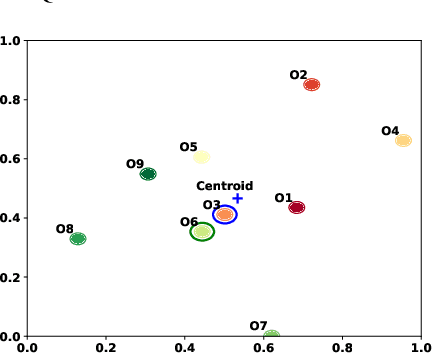

Abstract:The extensive scope of large language models (LLMs) across various domains underscores the critical importance of responsibility in their application, beyond natural language processing. In particular, the randomized nature of LLMs, coupled with inherent biases and historical stereotypes in data, raises critical concerns regarding reliability and equity. Addressing these challenges are necessary before using LLMs for applications with societal impact. Towards addressing this gap, we introduce REQUAL-LM, a novel method for finding reliable and equitable LLM outputs through aggregation. Specifically, we develop a Monte Carlo method based on repeated sampling to find a reliable output close to the mean of the underlying distribution of possible outputs. We formally define the terms such as reliability and bias, and design an equity-aware aggregation to minimize harmful bias while finding a highly reliable output. REQUAL-LM does not require specialized hardware, does not impose a significant computing load, and uses LLMs as a blackbox. This design choice enables seamless scalability alongside the rapid advancement of LLM technologies. Our system does not require retraining the LLMs, which makes it deployment ready and easy to adapt. Our comprehensive experiments using various tasks and datasets demonstrate that REQUAL- LM effectively mitigates bias and selects a more equitable response, specifically the outputs that properly represents minority groups.
FairEM360: A Suite for Responsible Entity Matching
Apr 10, 2024Abstract:Entity matching is one the earliest tasks that occur in the big data pipeline and is alarmingly exposed to unintentional biases that affect the quality of data. Identifying and mitigating the biases that exist in the data or are introduced by the matcher at this stage can contribute to promoting fairness in downstream tasks. This demonstration showcases FairEM360, a framework for 1) auditing the output of entity matchers across a wide range of fairness measures and paradigms, 2) providing potential explanations for the underlying reasons for unfairness, and 3) providing resolutions for the unfairness issues through an exploratory process with human-in-the-loop feedback, utilizing an ensemble of matchers. We aspire for FairEM360 to contribute to the prioritization of fairness as a key consideration in the evaluation of EM pipelines.
AXOLOTL: Fairness through Assisted Self-Debiasing of Large Language Model Outputs
Mar 01, 2024



Abstract:Pre-trained Large Language Models (LLMs) have significantly advanced natural language processing capabilities but are susceptible to biases present in their training data, leading to unfair outcomes in various applications. While numerous strategies have been proposed to mitigate bias, they often require extensive computational resources and may compromise model performance. In this work, we introduce AXOLOTL, a novel post-processing framework, which operates agnostically across tasks and models, leveraging public APIs to interact with LLMs without direct access to internal parameters. Through a three-step process resembling zero-shot learning, AXOLOTL identifies biases, proposes resolutions, and guides the model to self-debias its outputs. This approach minimizes computational costs and preserves model performance, making AXOLOTL a promising tool for debiasing LLM outputs with broad applicability and ease of use.
Chameleon: Foundation Models for Fairness-aware Multi-modal Data Augmentation to Enhance Coverage of Minorities
Feb 02, 2024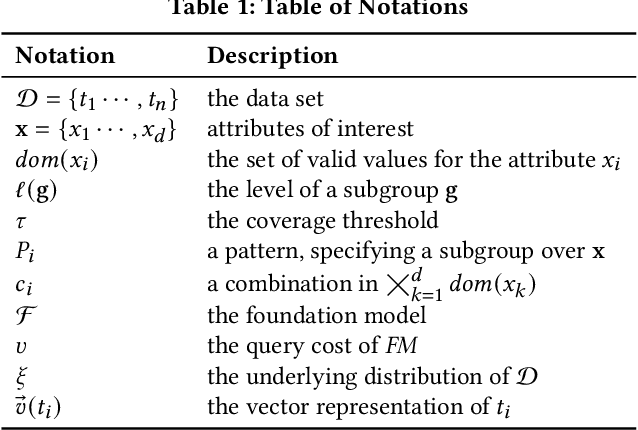
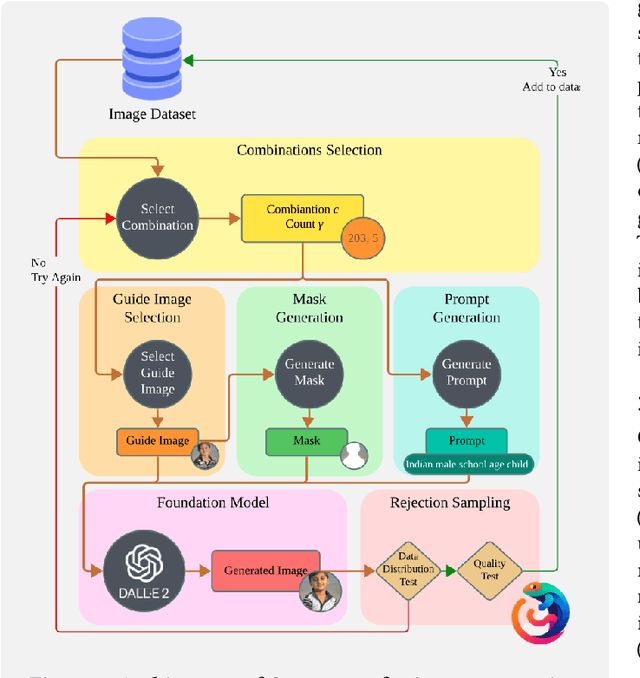
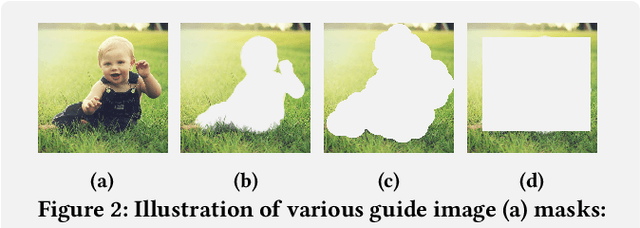
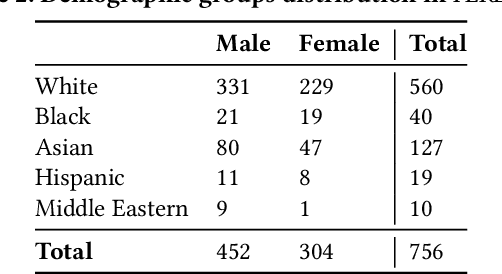
Abstract:The potential harms of the under-representation of minorities in training data, particularly in multi-modal settings, is a well-recognized concern. While there has been extensive effort in detecting such under-representation, resolution has remained a challenge. With recent advancements in generative AI, large language models and foundation models have emerged as versatile tools across various domains. In this paper, we propose Chameleon, a system that efficiently utilizes these tools to augment a data set with a minimal addition of synthetically generated tuples, in order to enhance the coverage of the under-represented groups. Our system follows a rejection sampling approach to ensure the generated tuples have a high quality and follow the underlying distribution. In order to minimize the rejection chance of the generated tuples, we propose multiple strategies for providing a guide for the foundation model. Our experiment results, in addition to confirming the efficiency of our proposed algorithms, illustrate the effectiveness of our approach, as the unfairness of the model in a downstream task significantly dropped after data repair using Chameleon.
 Add to Chrome
Add to Chrome Add to Firefox
Add to Firefox Add to Edge
Add to Edge